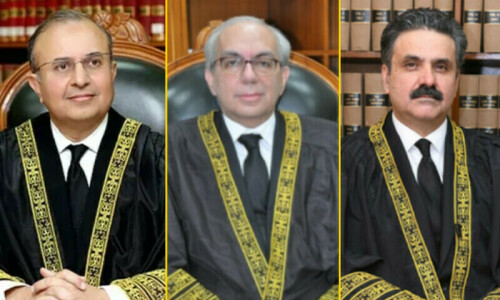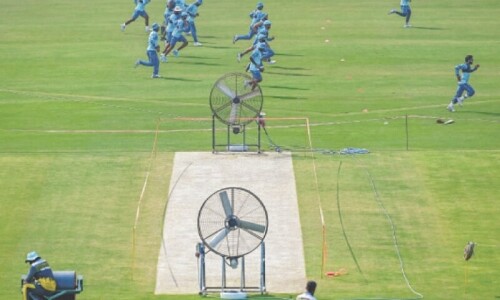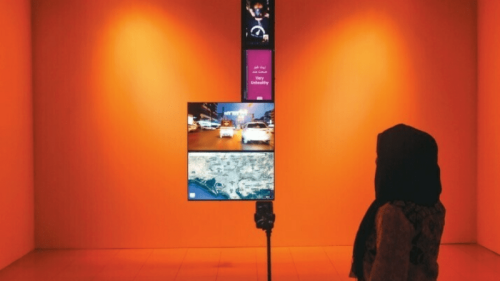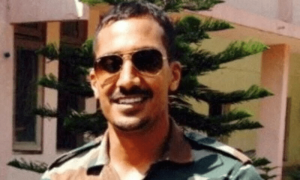With many Pakistani actors crossing over to Bollywood, India has taken the opportunity to help bridge the gap further between the two nations - this time through music.
On Independence Day, Indian band, "Maati Baani" launched a melodious song, "Rang Rangiya" in collaboration with various Pakistani music artists, to celebrate the unity in diversity between both nations.
The word “Maati Baani” literally means language of the earth.
Originally formed in 2012 in Mumbai, by guitarist Kartik Shah and classical singer, Nirali Kartik, the vision behind the band is to transcend borders and connect people through music despite their differences.
 |
| Kartik Shah and Nirali Kartik. – Photo courtesy "Maati Baani" team |
"Rang Rangiya" is a humble offering to friendship between India and Pakistan, noted the group, especially when the leaders of both countries are making such strong efforts to foster peace between the nations.
Speaking to Dawn.com, Evelyn D’souza, one of the main members of the production team and head of talent search and coordination, said, "Everything was online."
This was the main reason, she said, that helped in reaching out to artists in Pakistan.
The team found Pakistani artists, Komal Rizvi (singer), Gulab Afridi (Rubab player), Omran Shafique (guitarist), Kurt Menezes (drummer) and Asfandyar Junejo (beatboxer) on YouTube. They reached out to them and started recording. No musician from either country charged any fees for working on the song.
 |
| Official poster for song "Rang Rangiya". – Photo courtesy "Maati Baani" team |
“We used two different cinematographers, each from Karachi and Lahore. They did the video shoot with us and sent it across for editing,” explained D’souza.
This is the first time Pakistani and Indian musicians have worked together online to create a song – that too for Independence Day.
“It’s been amazing [to communicate with people in Pakistan]. Initially, we were a little apprehensive because we weren’t’ sure what response we’d get, [but] they were actually more eager to do this [project] than anyone else,” shared D’souza.
D'souza highlights that because Kartik and Nirani only got the idea for this project a month ago, this was the first time they produced a great song in such little time.
“It would be so much nicer and bigger if had more time. We received a wonderful response, [but] It was a very last minute project so couldn’t do more.”
The main idea behind the song is to spread love across borders, and music is one of the best mediums – one in which there is room for all kinds of differences, be it language, culture, or rhythm.
“We’d like to make more music with message of love,” said D’souza. “When people all around are fighting, I think musicians should come together to spread peace.”
She further added that the team would love to come to Pakistan to collaborate with more Pakistani artists, knowing that there is an abundance of unexplored talent in this country.
“What’s more interesting is that people in this song are from remote areas and it is amazing to see that they’re so technically sound. [We] want to pack our bags and come to Pakistan. There’s so much unexplored talent.”
The song incorporates beautiful lyrics and a diverse set of instruments, including some lines of poetry from the great mystic Kabir:
Preet Na Kije Panchhi Jaise,
Jal Sukhe Ud Jaaye,
Preet toh Kije Machhli Jaise,
Jale Sukhe Mar Jaaye.
The song is soulful, soothing and upbeat at the same time. Not to mention, Pakistani singer, Komal Rizvi's talented voice compliments Nirani's notes spectacularly, as she incorporates Bulleh Shah's poetry.
D'souza mentioned how in awe the team was by Gulab Afridi's (Peshawar) playing of the Rubab, which he described, as "the lion of all instruments."
"It [rubab] gave a beautiful touch to the song," says D'souza.
D'souza shared that this project took a lot of effort from all the members of the team and could not have been possible, had they not believed in themselves and in world peace.
“Musicians have to make an effort. [They] have to know deep down that this is what they really want to do.”
“Miracles can happen if you believe in yourself and your music.”











































